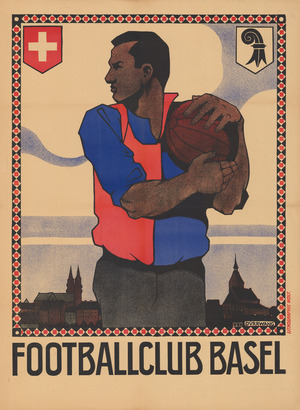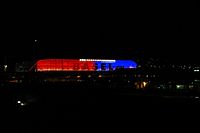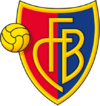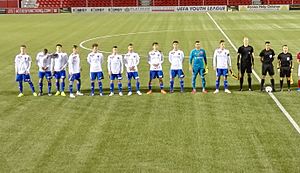FC Basel facts for kids
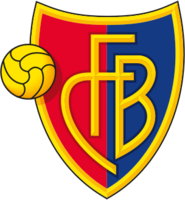 |
|||
| Full name | Football Club Basel 1893 | ||
|---|---|---|---|
| Nickname(s) | FCB, Bebbi (Citizen of Basel), RotBlau | ||
| Short name | FCB | ||
| Founded | 15 November 1893 | ||
| Ground | St. Jakob-Park | ||
| Capacity | 38,512 | ||
| Owner | FCB Holding AG (David Degen) |
||
| President | Reto Baumgartner | ||
| Manager | Ludovic Magnin | ||
| League | Swiss Super League | ||
| 2024–25 | Swiss Super League, 1st of 12 (champions) | ||
|
|
|||
Fussball Club Basel 1893, usually called FC Basel, is a professional football club from Basel, Switzerland. The club started in 1893. FC Basel has won the Swiss national championship 21 times. They have also won the Swiss Cup 14 times and the Swiss League Cup once.
FC Basel played in European competitions for 25 years in a row, from 1999 to 2024. They have reached the group stage of the Champions League seven times. This is more than any other Swiss club. They are also the only Swiss club to get into this stage directly. In 2021, they set a new record for a Swiss team. They earned 14 points in their Europa Conference League group, which was a great international success. Since 2001, the team has played its home games at St. Jakob-Park. This stadium was built where their old home, St. Jakob Stadium, used to be. Their team colours are red and blue, which is why they are nicknamed RotBlau.
Contents
Club History: How FC Basel Started
The Early Years of FC Basel
FC Basel began because Roland Geldner placed an advertisement in a newspaper on November 12, 1893. He wanted to form a football team. Eleven men met on November 15, 1893, and officially started Fussball Club Basel. The club's colours were red and blue from the very first day.
Basel's first game was on November 26, 1893. It was an internal match between two FCB teams. Two weeks later, FCB played its first official game against students from a high school club. FCB won that game 2–0. For a while, Basel only played friendly matches. They joined the Swiss Serie A championship in 1898. Basel did not have much success in its early years. They had to wait 40 years to win their first trophy.
In the 1932–33 season, Karl Kurz became the team's coach. Basel finished second in their league group. They then reached the final of the Swiss Cup. Basel won the cup 4–3 against Grasshoppers. This was their first national title ever.
After this success, Basel played in the middle of the league for a few seasons. However, in the 1938–39 Nationalliga season, they finished last and were moved down to a lower league. They were promoted back to the top league in 1942. After being relegated again, they quickly returned to the top league in the 1944–45 season.
In the 1946–47 season, Basel won the Swiss Cup for the second time. They beat Lausanne Sports 3–0 in the final. In the 1952–53 season, Basel won their first league title. They finished four points ahead of BSC Young Boys.
FC Basel's Rise to Success
In the 1966–67 season, Basel won their first league title under coach Helmut Benthaus. They finished just one point ahead of FC Zürich. In the Swiss Cup final that season, Basel played against Lausanne-Sports. Basel won 3–0 after a controversial penalty. This meant Basel won the league and cup in the same season, which is called winning the double. This was the first time the club had achieved this.
Winning the league in 1966–67 allowed Basel to play in the European Cup for the first time. However, they were knocked out in the first round. Basel won the league again in the 1968–69 and 1969–70 seasons.
In the 1970–71 European Cup, Basel reached the second round. They lost to Ajax after beating Spartak Moscow. Basel won two more league titles in a row in 1971–72 and 1972–73. In 1972, Basel also won the first ever Swiss League Cup.
In the 1973–74 European Cup, Basel did very well. They had the famous Peruvian player Teófilo Cubillas on their team. They reached the quarter-finals before losing closely to Celtic. Basel won the Swiss Cup again in 1975.
Basel won the league title in 1977 and again in 1980. However, after their coach Helmut Benthaus left in 1982, Basel's performance dropped. They were moved down to a lower league in 1988.
Basel finally returned to the top league in 1994. After a few years, Christian Gross became the manager in 1999. With new financial support, Basel soon returned to the top of Swiss football.
FC Basel's Modern Success
The new St. Jakob-Park stadium opened on March 15, 2001. Basel finished the 2000–01 season in fourth place. In the 2001–02 season, Basel won their first league title in 22 years. They also won the Swiss Cup, completing a domestic double.
In the 2002–03 season, Basel became the second Swiss team to play in the UEFA Champions League. They reached the second group stage. Domestically, Basel finished second in the league and won the Swiss Cup again.
Basel had an amazing start to the 2003–04 season, winning 13 league games in a row. They went on to win their 10th Swiss championship. They won the league title again in 2004–05 by ten points.
In the 2005–06 Champions League, Basel were knocked out in the qualifying rounds. They then played in the UEFA Cup, reaching the quarter-finals. On February 26, 2006, Basel broke their own record of 52 unbeaten home league games, extending it to 59. However, they lost the league title on the final day of the season to FC Zürich. This led to some trouble between rival fans after the match.
In 2006–07, Basel finished second in the league but won the Swiss Cup for the eighth time. They also reached the group stages of the UEFA Cup.
Recent Achievements and European Journeys
In the 2007–08 season, Basel had a strong run in the UEFA Cup. They reached the last 32 before being knocked out by Sporting CP. Basel won the Swiss Cup for the second year in a row in April 2008. They also won the Swiss Super League title on May 10, 2008, in the final game of the season against Young Boys.
In the 2008–09 season, Basel qualified for the UEFA Champions League group stages. They were in a tough group with Barcelona, Shakhtar Donetsk, and Sporting CP. They finished third in the league that season. After ten years, Christian Gross left his role as FC Basel manager.
Thorsten Fink became the new manager in 2009. In the 2009–10 season, Basel won the league title on the last day of the season. They also won the 2009–10 Swiss Cup final, which was their tenth cup win.
In the 2010–11 UEFA Champions League, Basel reached the group stage. On October 13, 2011, Thorsten Fink left the club. His assistant, Heiko Vogel, took over. Basel made history by qualifying for the knockout phase of the Champions League after beating Manchester United 2–1. They then beat Bayern Munich 1–0 in the first leg of the Round of 16, but lost the return leg 7–0 and were eliminated.
In October 2012, Murat Yakin became the new manager. Basel went on to win their fourth league title in a row that season. In the 2012–13 UEFA Europa League, Basel had a fantastic run. They reached the semi-finals, beating teams like Dnipro Dnipropetrovsk, Zenit Saint Petersburg, and Tottenham Hotspur. They were eventually knocked out by Chelsea.
Basel continued to play in the Champions League and Europa League in the following seasons. They won the league championship for the sixth time in a row in the 2014–15 season. Urs Fischer became the head coach in 2015.
On April 30, 2016, Basel won their seventh consecutive Swiss national championship. They also won the Swiss Super League for the eighth time in a row in 2017, which was the club's 20th championship title overall. They also won the Swiss Cup for the twelfth time, completing another double.
In the 2017–18 season, Raphaël Wicky became the new manager. Basel's long run of winning the Swiss league title ended in 2018, as BSC Young Boys won the championship. Later, Basel reached the quarter-finals of the 2019–20 UEFA Europa League for the third time.
Supporters and Rivalries
FC Basel Fans
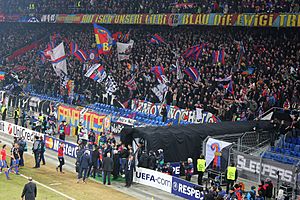
FC Basel is famous for having many loyal fans in their home city. When people talk about passionate football fans, FC Basel's supporters are often mentioned among the top in the world. Around 30,000 fans attend every home game. World tennis legend Roger Federer is one of the club's most famous fans.
In November 2010, Basel supporters threw hundreds of tennis balls onto the pitch during a game against FC Luzern. This was a protest because the game's start time was changed to make way for a tennis tournament on TV.
Rivalries with Other Clubs
The cities of Basel and Zürich have a long-standing rivalry. Because of this, FC Basel's biggest rivals are Grasshopper Club Zürich and FC Zürich. In recent years, the rivalry with FC Zürich has grown stronger. This is because Zürich has won the league championship over Basel by small margins.
Fans from both sides have caused problems in the past. The worst incident happened in May 2006. Basel needed to win or draw against Zürich at home on the last day of the season to win the league. Zürich scored a late goal and won the match and the league. After the game, players and fans from both teams started fighting. This event has created strong feelings between the fans of FC Zürich and FC Basel.
Stadium: St. Jakob-Park
FC Basel plays its home games at St. Jakob-Park. The stadium can hold 37,500 people.
UEFA has given the stadium a 4-star rating, which is the highest rating for a stadium of its size. St. Jakob-Park opened in 2001. It was expanded to hold 42,500 people when Switzerland co-hosted UEFA Euro 2008. After Euro 2008, some seats were removed to create more space, and the capacity became 37,500. Fans call the stadium "Joggeli". It has restaurants and a shopping centre. It also has its own train station.
St. Jakob-Park hosted six matches during Euro 2008, including the opening game. A cool feature of the stadium is its outer layer, which can light up in different colours. This effect was later copied for Bayern Munich's stadium, the Allianz Arena.
Before St. Jakob-Park was built, FC Basel played at the Landhof and then at the old St. Jakob Stadium. During the construction of the new stadium, Basel played at the Stadion Schützenmatte. In 2016, the UEFA Europa League final was played at St. Jakob-Park.
Affiliated Clubs
 FC Concordia Basel – FC Basel is the main club for Concordia, a local team. Many young players from Basel have played for Concordia on loan. Basel has also signed players from Concordia.
FC Concordia Basel – FC Basel is the main club for Concordia, a local team. Many young players from Basel have played for Concordia on loan. Basel has also signed players from Concordia.
Colours and Logo
FC Basel's traditional uniform is a red and blue shirt. The club's founders chose these colours because they were also the colours of the "Basler Ruder-Club" (a rowing club). The uniform is completed with blue shorts and blue socks. This is why the team is nicknamed "RotBlau", which means "RedBlue" in Swiss German and German. Their away uniform is all white with red and blue stripes.
FC Basel's uniforms are made by Adidas. The main sponsor is Novartis, a large pharmaceutical company based in Basel. Inside the jerseys, it says: "Rot isch unseri Liebi, Blau die ewigi Treui, Basel unseri Stadt." This means "Red is our love, blue the eternal loyalty, Basel our city."
There is a story that the famous red and blue colours of FC Barcelona came from FC Basel's colours. This story came about because Joan Gamper, who founded both FC Zürich and FC Barcelona, played a few friendly games for FC Basel. However, FC Barcelona believes their colours came from a rugby team in England.
For the 2008–09 season, Basel changed their shirt to have red and blue vertical stripes, similar to Barcelona's traditional shirt. At the same time, Barcelona changed their shirt to have one half red and the other half blue, which looked like Basel's traditional shirt.
Basel's current logo is a shield, with the left side red and the right side blue. The shield has a gold outline, and in the middle, it says "FCB" in gold letters. This stands for "Football Club Basel". The logo is placed in the centre of the shirt. Like the club's colours, the logo looks a lot like Barcelona's. Some people think that Barcelona's founder, who was once a captain at Basel, used Basel's logo as inspiration for Barcelona's. Both logos use a shield design, have the "FCB" initials, and use red and blue colours with gold outlines. Also, the football on the left side of the Basel logo looks very similar to the one on the Barcelona logo. Many believe this shows that Basel inspired Barcelona's founding.
Club Records
- Furthest in Champions League: Round of 16 (2002–03, 2011–12, 2014–15, 2017–18)
- Furthest in UEFA Europa League: Semi-finals (2012–13)
- Furthest in UEFA Europa Conference League: Semi-finals (2022–23)
- Biggest European home win: Basel 7–0
 Folgore (2000)
Folgore (2000) - Biggest European away win:
 Fram 0–5 Basel (1973)
Fram 0–5 Basel (1973) - Biggest European home defeat: Basel 0–5
 Barcelona (2008)
Barcelona (2008) - Biggest European away defeat:
 Bayern Munich 7–0 Basel (2012)
Bayern Munich 7–0 Basel (2012) - Most league appearances:
 Massimo Ceccaroni (398 games)
Massimo Ceccaroni (398 games) - Most league goals:
 Josef Hügi (244 goals)
Josef Hügi (244 goals) - Record for unbeaten home league games: 59 games (February 2003 to May 2006)
- Record for consecutive unbeaten games: 26 games (2011–12)
- Highest attendance at St. Jakob Stadium: 60,000 people
- Highest attendance at St. Jakob-Park: 42,500 people
- Most international games played by a foreign player:
 Teófilo Cubillas, 81 games for Peru
Teófilo Cubillas, 81 games for Peru - Most international games played by a Swiss player:
 Alexander Frei, 82 games
Alexander Frei, 82 games
Top League Goalscorers
| # | Nat. | Name | Career | Goals |
|---|---|---|---|---|
| 1 | Josef Hügi | 1948–1962 | 245 | |
| 2 | Erni Maissen | 1975–1982 1983–1987 1989–1991 |
116 | |
| 3 | Marco Streller | 2000–2004 2007–2015 |
111 | |
| 4 | Christian Giménez | 2001–2005 | 94 | |
| 5 | Karl Odermatt | 1963–1976 | 92 |
Most League Appearances
| # | Nat. | Name | Career | Apps |
|---|---|---|---|---|
| 1 | Massimo Ceccaroni | 1987–2002 | 398 | |
| 2 | Erni Maissen | 1975–1982 1983–1987 1989–1991 |
338 | |
| 3 | Fabian Frei | 2007–2015 2018–2024 |
322 | |
| 4 | Werner Bopp | 1944–1960 | 321 | |
| 5 | Josef Hügi | 1948–1962 | 319 |
Club Honours
| Type | Competition | Titles | Seasons |
|---|---|---|---|
| Domestic | Swiss Super League | 21 |
1952–53, 1966–67, 1968–69, 1969–70, 1971–72, 1972–73, 1976–77, 1979–80, 2001–02, 2003–04, 2004–05, 2007–08, 2009–10, 2010–11, 2011–12, 2012–13, 2013–14, 2014–15, 2015–16, 2016–17, 2024–25 |
| Swiss Cup | 14 |
1932–33, 1946–47, 1962–63, 1966–67, 1974–75, 2001–02, 2002–03, 2006–07, 2007–08, 2009–10, 2011–12, 2016–17, 2018–19, 2024–25 |
|
| Swiss League Cup | 1 |
1972 |
European Record
FC Basel has played many games in European competitions. Here's a summary of their performance:
| Competition | Games Played | Wins | Draws | Losses | Goals For | Goals Against |
|---|---|---|---|---|---|---|
| Champions League / European Cup | 49|25|48|177|196 | |||||
| Europa League / UEFA Cup | 50|24|36|184|138 | |||||
| UEFA Europa Conference League | 18|8|8|62|40 | |||||
| Cup Winners' Cup | 0|1|3|3|13 | |||||
| Inter-Cities Fairs Cup | 1|1|8|3|13 | |||||
| Total | 109|57|100|398|383 |
Club Ownership and Management
FC Basel Holding AG
The FC Basel Holding AG owns 75% of FC Basel 1893 AG. The other 25% is owned by the club members of FC Basel 1893. The FC Basel 1893 AG handles the daily running of the club, including the first team and youth teams.
In May 2021, after many fan protests, the ownership changed. David Degen became the main owner with 92% of the shares. A new board of directors was elected in June 2021.
Club Management Team
The club's management team includes the president and directors. They make important decisions for the club.
Updated to match played 15 May 2024
Source: FCB Official Site: http://www.fcb.ch/Verein
Team Management and Coaches
The team management includes the head coach and assistant coaches. They are in charge of training the players and deciding game strategies.
Source: FCB Official Site: https://www.fcb.ch/teams/1-mannschaft/trainer/
Players
Current Squad
|
|
Players Out on Loan
|
Retired Numbers
Some jersey numbers are retired at FC Basel to honour special players or the fans:
|
Women's Team
Since 2009, FC Basel has a women's football team. They play in the top women's league, the Nationalliga A.
Superleague Formula Team
FC Basel also had a team in the Superleague Formula, a racing series where cars represented football clubs. The FC Basel car won one race in 2009.
Youth System
Basel has a very good youth academy. It helps many young players become professional footballers in Switzerland's top league. The main goal of the youth department is to get as many young players as possible into the first team. They focus on training players well and helping them with their education.
Many Swiss international players have come from Basel's youth system, like Erni Maissen, Alexander Frei, and Marco Streller. Since moving to St. Jakob-Park in 2001, the club has improved its youth academy. Many talented players like Xherdan Shaqiri, Yann Sommer, and Mohammed Salah have developed there.
Since 2001, over 50 successful players have come through Basel's youth system and joined their first team, including:
|
|
|
The youth academy has different age groups: U-21, U-19, U-17, U1-6, U-15, FE-14, FE-13, and FE-12.
Under-21 Team
The oldest youth players are in the U-21 team. This team plays in the Swiss Promotion League, which is the third highest football league in Switzerland. Some players in this team have professional contracts and often train or play with the first team.
Current U-21 Squad
|
|
Under-19 Team
Until 2023, there was no official Basel U-19 team in Swiss football. When Basel qualified for the UEFA Champions League, a U-19 team was formed to play in the UEFA Youth League. This team was made up of players from the U-21 and U-18 teams.
In recent years, the U-19 team has become more serious. They train together almost every day. This has led to better results in the UEFA Youth League. For example, in the 2023–24 UEFA Youth League, they advanced through qualification but were knocked out by Bayern Munich.
Images for kids
See also
 In Spanish: Fútbol Club Basilea para niños
In Spanish: Fútbol Club Basilea para niños
 | William L. Dawson |
 | W. E. B. Du Bois |
 | Harry Belafonte |


